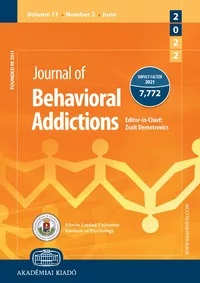A longitudinal study of the effects of problematic smartphone use on social functioning among people with schizophrenia: Mediating roles for sleep quality and self-stigma
A longitudinal study of the effects of problematic smartphone use on social functioning among people with schizophrenia: Mediating roles for sleep quality and self-stigma
Author(s): Kun-Chia Chang, Yun-Hsuan Chang, Cheng-Fang Yen, Jung-Sheng Chen, Po-Jen Chen, Chung-Ying Lin, Mark D. Griffiths, Marc N. Potenza, Amir H. PakpourSubject(s): Behaviorism
Published by: Akadémiai Kiadó
Keywords: schizophrenia; sleep; smartphone use; social function; stigma; internet addiction; addictive behaviors
Summary/Abstract: Background and aims. Individuals with schizophrenia may often experience poor sleep, self-stigma, impaired social functions, and problematic smartphone use. However, the temporal relationships between these factors have not been investigated. The present study used a longitudinal design to examine potential mediating roles of poor sleep and self-stigma in associations between problematic smartphone use and impaired social functions among individuals with schizophrenia. Methods. From April 2019 to August 2021, 193 individuals with schizophrenia (mean [SD] age = 41.34 [9.01] years; 88 [45.6%] males) were recruited and asked to complete three psychometric scales: the Smartphone Application-Based Addiction Scale to assess problematic smartphone use; the Pittsburgh Sleep Quality Index to assess sleep quality; and the Self-Stigma Scale-Short Scale to assess self-stigma. Social functioning was evaluated by a psychiatrist using the Personal and Social Performance Scale. All measures were assessed five times (one baseline and four follow-ups) at three-month intervals between assessments. Results. General estimating equations found that problematic smartphone use (coefficient = −0.096, SE = 0.021; P < 0.001), sleep quality (coefficient = −0.134, SE = 0.038; P < 0.001), and self-stigma (coefficient = −0.612, SE = 0.192; P = 0.001) were significant statistical predictors for social functioning. Moreover, sleep quality and self-stigma mediated associations between problematic smartphone use and social functioning. Conclusion. Problematic smartphone use appears to impact social functioning longitudinally among individuals with schizophrenia via poor sleep and self-stigma concerns. Interventions aimed at reducing problematic smartphone use, improving sleep, and addressing self-stigma may help improve social functioning among individuals with schizophrenia.
Journal: Journal of Behavioral Addictions
- Issue Year: 11/2022
- Issue No: 2
- Page Range: 567-576
- Page Count: 10
- Language: English

